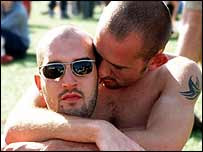 SAN JOSE, Calif. (AP) — Two men are suing a Northern California amusement park after they say employees posted a photograph of them riding a roller coaster with a caption labeling them with a homophobic slur.
SAN JOSE, Calif. (AP) — Two men are suing a Northern California amusement park after they say employees posted a photograph of them riding a roller coaster with a caption labeling them with a homophobic slur.Craig Person and Edmund Yang were photographed holding hands on the Psycho Mouse ride at California's Great America park in August 2008, according to the complaint filed Monday in Santa Clara County Superior Court. The pair viewed the digital photo after the ride but declined to purchase it.
Later in the day, their friend saw the same photo printed out and displayed on a counter at another ride after someone had added a bubble caption above their heads that contained the slur, the complaint said. The friend confiscated the photo and turned it over to Person and Yang.
Wendy Musell, an attorney for the plaintiffs, said the men immediately went to Great America human resources managers, who were initially responsive to their concerns but eventually stopped communication with them, prompting the lawsuit.
The 10-count complaint, which names Great America and its parent company Cedar Fair Entertainment Co., alleges sexual harassment, discrimination, invasion of privacy and infliction of emotion distress by park employees. It also accuses the park of negligence in its hiring and supervision of workers.
Musell said the plaintiffs were humiliated by the photo display.
"Mr. Yang was in the process of coming out, and it was very difficult for him to deal with this type of ridicule based on his sexual orientation," she said Tuesday.
The lawsuit seeks unspecified damages and policy changes at the park.
"Even if there was an anti-discrimination policy, the employees weren't adequately trained regarding the policy, nor was there adequate oversight, for this type of event to occur," Musell said.
Great America spokesman Jim Stellmack said Tuesday that he had not yet seen the complaint, but maintained that park managers "took appropriate actions" in dealing with the situation.
"The park doesn't condone the action, and managers dealt appropriately with the employees involved," Stellmack said. He declined to elaborate on what those actions were, citing privacy in personnel matters.
